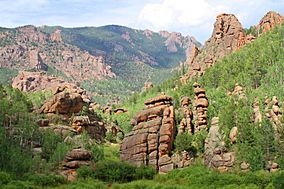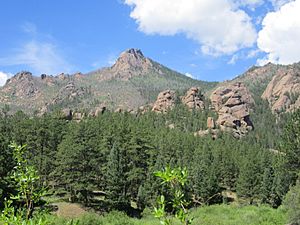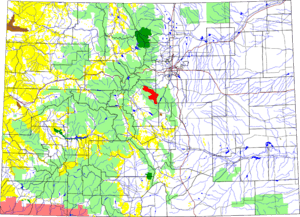Lost Creek Wilderness facts for kids
Quick facts for kids Lost Creek Wilderness |
|
|---|---|
|
IUCN Category Ib (Wilderness Area)
|
|

Lost Creek Wilderness
|
|
| Location | Park / Jefferson counties, Colorado, USA |
| Nearest city | Denver, CO |
| Area | 119,790 acres (484.8 km2) |
| Established | January 1, 1980 |
| Governing body | U.S. Forest Service |
The Lost Creek Wilderness is a special natural area in central Colorado, USA. It covers about 119,790 acres (485 square kilometers). This amazing place is located in Jefferson and Park counties. It is south of the town of Bailey and completely inside the Pike National Forest.
A part of this wilderness, called the Lost Creek Scenic Area, is also very important. It's a 16,798-acre (68 square kilometers) site. This area was named a National Natural Landmark because of its unique features.
Contents
Exploring the Lost Creek Wilderness
This wilderness gets its name from Lost Creek. This is a stream that seems to disappear and then reappear many times. It eventually joins Goose Creek, which flows into the South Platte River. All the water in this area helps form a watershed for the Platte River.
Amazing Rock Formations
The Lost Creek Wilderness is famous for its incredible rock formations. You can see many natural arches here. There are also rounded granite domes and knobs. These cool rock shapes are found in two mountain ranges. These are the Kenosha Mountains and the Tarryall Mountains. They are low foothills of the mighty Rocky Mountains.
The highest point in the wilderness is Bison Peak. It stands tall at 12,431 feet (3,789 meters).
Fun Activities in the Wilderness
Because it's close to Denver, this area is very popular. Many people visit for outdoor fun all year round. In summer, you can enjoy hiking, backpacking, and rock-climbing. When winter comes, activities include cross-country skiing, snowshoeing, and winter camping.
The wilderness has about 130 miles (209 kilometers) of trails. A part of the famous Colorado Trail goes through here. It crosses Lost Creek and then runs along the northeast side towards Kenosha Pass.
Home of the American Bison
This area, sometimes called Lost Park, has a special history. It was one of the last places where the American bison lived freely in the United States. These magnificent animals once roamed vast areas.
The Lost Creek Scenic Area
The Lost Creek Scenic Area is a special part of the wilderness. It covers 16,798 acres (68 square kilometers). This area was created in 1963 to protect its unique features. It became a National Natural Landmark in 1966.
It is located within the Pike National Forest. This scenic area is found in both Park and Jefferson counties. Here, you can find amazing rock formations. There are tall pinnacles and spires in narrow gorges and on ridges. The stream here is famous for disappearing and reappearing many times.
 In Spanish: Área salvaje Arroyo Lost para niños
In Spanish: Área salvaje Arroyo Lost para niños
 | Misty Copeland |
 | Raven Wilkinson |
 | Debra Austin |
 | Aesha Ash |




